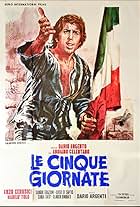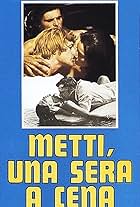Four young girls (Claudia, Monica, Michèle and Marina) and two boys (Peter and Marco) during an excursion by motorboat are running out of gasoline.Four young girls (Claudia, Monica, Michèle and Marina) and two boys (Peter and Marco) during an excursion by motorboat are running out of gasoline.Four young girls (Claudia, Monica, Michèle and Marina) and two boys (Peter and Marco) during an excursion by motorboat are running out of gasoline.
Storyline
Did you know
- TriviaItalian censorship visa # 54799 delivered on 11 October 1969.
Featured review
Despite the promise gleaned from the plot line of sex and death in a remote island setting and the contributions behind the camera of co-screenwriter Dario Argento and composer Ennio Morricone (soon to re-unite on the former's directorial debut - THE BIRD WITH THE CRYSTAL PLUMAGE [1970]), this boring would-be psychodrama is sunk by incompetent handling and its own naïve pretensions.
Udo Kier is the wealthy but decadent recluse (who has just murdered his domineering and ageing mistress and whose relationship is shown in intermittent and rather pointless flashbacks) presiding over the island but who's also something of a sportsman. When he brandishes a machine gun and lets his German sheperd loose after the four girls who turn up unannounced at his abode, one would think we'd be in for a psychedelic variant on that old warhorse - THE MOST DANGEROUS GAME (1932) - but, alas, this angle was stymied before it had even begun! Instead, we're dealt vapid dinner-table conversations, lectures on sexuality(!), stupid parlor games (balls are dunked in paint and thrown at Kier who has to ditch them, before turning into a free-for-all), even sillier fashion shows (with the girls prancing about in front of the camera, which follows them voyeuristically) and, of course, constant squabbling among the amorous but clueless girls over who gets to sleep with the young master of the house!
The soft, colorful look of the film is typical of its era but Morricone's score seems uninspired by the material. The most alluring of the girls is played by Ewa Thulin, whom I had only seen in the interesting sexploitationer THE SEDUCERS (1969) early this year while in Hollywood, and in which she had held her own against favorite "Euro-Cult" starlets Rosalba Neri and Edwige Fenech! As for the downbeat twist at the end, it would have been a good deal more effective had any actual sympathy been mined for any of the characters during the course of the film...
All in all, a dated time-capsule which, considering some of the talent involved could have been more intriguingly developed.
Udo Kier is the wealthy but decadent recluse (who has just murdered his domineering and ageing mistress and whose relationship is shown in intermittent and rather pointless flashbacks) presiding over the island but who's also something of a sportsman. When he brandishes a machine gun and lets his German sheperd loose after the four girls who turn up unannounced at his abode, one would think we'd be in for a psychedelic variant on that old warhorse - THE MOST DANGEROUS GAME (1932) - but, alas, this angle was stymied before it had even begun! Instead, we're dealt vapid dinner-table conversations, lectures on sexuality(!), stupid parlor games (balls are dunked in paint and thrown at Kier who has to ditch them, before turning into a free-for-all), even sillier fashion shows (with the girls prancing about in front of the camera, which follows them voyeuristically) and, of course, constant squabbling among the amorous but clueless girls over who gets to sleep with the young master of the house!
The soft, colorful look of the film is typical of its era but Morricone's score seems uninspired by the material. The most alluring of the girls is played by Ewa Thulin, whom I had only seen in the interesting sexploitationer THE SEDUCERS (1969) early this year while in Hollywood, and in which she had held her own against favorite "Euro-Cult" starlets Rosalba Neri and Edwige Fenech! As for the downbeat twist at the end, it would have been a good deal more effective had any actual sympathy been mined for any of the characters during the course of the film...
All in all, a dated time-capsule which, considering some of the talent involved could have been more intriguingly developed.
- Bunuel1976
- Jun 23, 2006
- Permalink
Details
Contribute to this page
Suggest an edit or add missing content




















